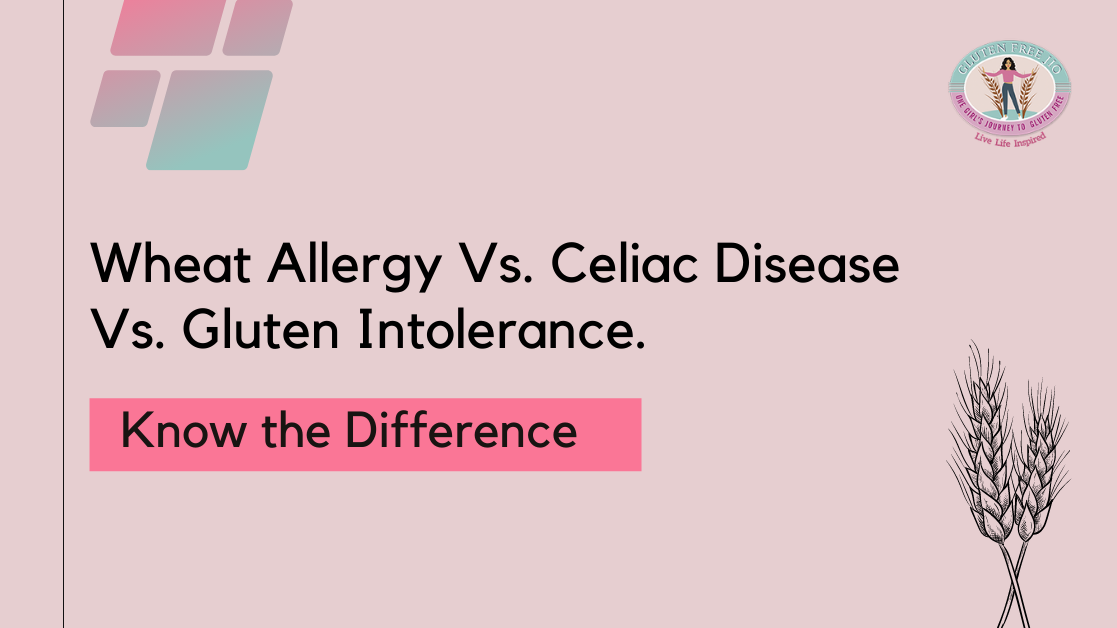Wheat Allergy Vs. Celiac Disease Vs. Gluten Intolerance: What’s the Difference?

The gluten-free diet has gained tremendous popularity in recent years, but many people still don’t understand what it means to go gluten-free or why someone would need to do so.
Do you ever get nauseous after eating gluten-containing meals like bread or pasta? Do you think you might have a wheat allergy, celiac disease, or gluten intolerance?
While these three conditions have similar symptoms, each person’s body reacts differently. Let’s take a closer look at the symptoms of each to gain more clarity.
Wheat Allergy
Wheat allergy sufferers have an immune system reaction to several dietary proteins found in wheat, including gluten. Unlike celiac disease, however, this immune response is usually just transitory.
Unless the reaction results in anaphylaxis, the most dangerous type of allergic reaction, a wheat allergy does not cause long-term damage to the small intestine. Wheat allergies, unlike celiac disease and gluten sensitivity, can be overcome.
Symptoms of Wheat Allergy
Many of the symptoms of wheat allergy are quite similar to those of gluten sensitivity. Here are the signs and symptoms:
- Constipation/stomach cramp
- Vomiting/ nausea
- Headache
- Congestion in the nose
- Breathing problem
- Skin rash
- Anaphylaxis
While a wheat allergy will not harm your intestines permanently, the possibility of anaphylaxis must be taken seriously. When diagnosed with wheat allergy, your doctor may recommend epinephrine, antihistamines, or a wheat-free diet.
Celiac Disease
Celiac disease is an autoimmune illness in which gluten (a protein found in wheat barley, or rye) causes genetically predisposed people to react. The lining of the small intestine is damaged over time as gluten provokes immune responses.
If they do not receive a diagnosis & suitable treatment, individuals with celiac disease experience malabsorption, or the inability of the small intestine to absorb nutrients into the bloodstream.
Related Read: Celiac Disease: A Serious Health Concern & Not Just Gluten-Free Craze
Symptoms of Celiac Disease
Many of the symptoms of celiac disease are directly related to the body’s inability to digest food effectively. These are some of them:
- Chronic Diarrhea
- Loss of weight
- Constipation
- Abdominal pain
- Fatigues
- Gas & bloating
- Nausea & Vomiting
Other signs of celiac disease include:
- Itchy skin
- Seizures
- Mouth ulcers
- Headaches & exhaustion
- Joint & bone pain
- Heartburn & acid reflux
Celiac disease is a serious autoimmune illness. If you’ve been diagnosed with celiac disease, eliminating gluten from your diet is the most effective method to manage your symptoms.
Gluten Intolerance
Gluten sensitivity, also known as non-celiac gluten intolerance, exhibits symptoms that are similar to celiac disease. When a celiac individual consumes gluten, his or her immune system attacks the tissue of his or her own body.
If a person is gluten intolerant, however, eating gluten will result in short-term bloating and stomach pain. Gluten intolerance is different from celiac disease as it does not usually harm your body in the long run.
Symptoms of Gluten Intolerance
Gluten intolerance manifests itself in a variety of ways, the majority of which are gastrointestinal. If you have any of these symptoms after consuming gluten-containing foods, you may be gluten intolerant. The following are some of the most prevalent symptoms of gluten intolerance:
- Diarrhea/Fatigue
- Gas
- Bloating
- Stomach Ache
- Constipation
- Nausea
Like celiac disease, other signs may not commonly be associated with gluten intolerance. These symptoms include:
- A severe stomachache
- Headache
- Joint and muscle pain
Seeing Your Family Physician
Do not hesitate to see your family doctor if you suspect you are suffering from any of these symptoms. Because your doctor will need a complete history of your symptoms, you must keep to your current diet until you receive specific recommendations from your doctor to limit or eliminate gluten from your diet. This allows the doctor to determine whether gluten is to blame for your symptoms.
Your doctor may order a variety of tests because the symptoms of all three illnesses are so similar. Each illness has its test that can be used to provide an accurate diagnosis:
→ Wheat Allergy
To determine if you have a wheat allergy, your doctor may perform a skin prick test or a blood test, similar to another allergy testing. Your doctor may also recommend that you eliminate gluten from your diet. An oral food challenge test, in which an allergist feeds you suspect foods in measured doses, may be performed as well.
→ Celiac Disease
Of the three tests, this is the most invasive. A tiny biopsy of your small intestine will be taken to diagnose celiac disease. The doctor will be able to tell if you have celiac disease based on this sample.
→ Gluten Intolerance
Doctors are less familiar with gluten intolerance than they are with celiac disease and wheat allergies. As a result, your doctor can only label you as gluten intolerant if he or she has ruled out celiac disease and wheat allergy using the appropriate tests.
Final Thoughts
If you have a wheat allergy, celiac disease, or gluten intolerance; you must immediately move to a gluten-free diet for a better life. You may be able to ingest regular amounts of gluten if your symptoms are minor and controllable if you have gluten sensitivity or gluten intolerance, but you may find that the side effects aren’t worth it.
Whatever end of the scale you fall on, you’ll be relieved to learn that there are more gluten-free meals available than ever before. You might not even have to give up your favorite foods; all you have to do is switch to gluten-free versions.
 MY JOURNEY
MY JOURNEY About Me
About Me Early life
Early life Diagnosis
Diagnosis CELIAC DISEASE
CELIAC DISEASE Symptoms & Diagnosis
Symptoms & Diagnosis Treatment & Follow Up
Treatment & Follow Up GLUTEN - FREE LIVING
GLUTEN - FREE LIVING At Home
At Home At School
At School At Social Events
At Social Events
 Grocery Shopping
Grocery Shopping COMMUNITY OUTREACH
COMMUNITY OUTREACH Gluten Free Meetup
Gluten Free Meetup Workshops
Workshops Webinars
Webinars COVID-19 Camps By Gluten Free Jio
COVID-19 Camps By Gluten Free Jio  Mid Day Meal
Mid Day Meal Beyond Celiac
Beyond Celiac Real Stories of Celiac
Real Stories of Celiac RESOURCES
RESOURCES Restaurant Dining Cards
Restaurant Dining Cards Recipes
Recipes Gluten Free eBook
Gluten Free eBook Gluten Free Jio App
Gluten Free Jio App RECOGNITION
RECOGNITION TRAVEL DIARY
TRAVEL DIARY



